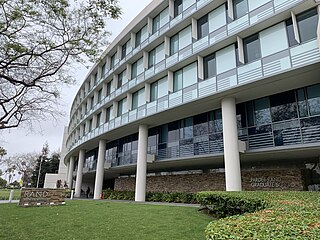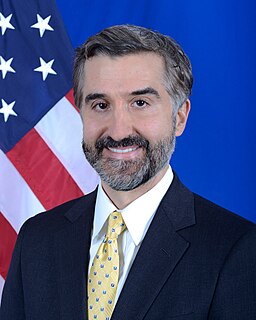Related Research Articles

The Hoover Institution is an American public policy think tank and research institution that promotes personal and economic liberty, free enterprise, and limited government. While the institution is formally a unit of Stanford University, it maintains an independent board of overseers and relies on its own income and donations. It is widely described as a conservative institution, although its directors have contested the idea that it is partisan.

Lawrence Lau Juen-yee, GBS, JP is a Hong Kong economist and the former Vice-Chancellor of the Chinese University of Hong Kong. He was a non-official member of the Executive Council of Hong Kong from 2009 to 2012. Before joining CUHK he was an economics professor at Stanford University.

Erik Brynjolfsson is an American academic, author and inventor. He is the Jerry Yang and Akiko Yamazaki Professor and a Senior Fellow at Stanford University where he directs the Digital Economy Lab at the Stanford Institute for Human-Centered AI, with appointments at SIEPR, the Stanford Department of Economics and the Stanford Graduate School of Business. He is also a research associate at the National Bureau of Economic Research and a best-selling author of several books. He is known for his contributions to the world of IT productivity research and work on the economics of information and the digital economy more generally.
John B. Shoven is the former Trione Director of the Stanford Institute for Economic Policy Research, the Charles R. Schwab Professor of Economics at Stanford University, the Buzz and Barbara McCoy Senior Fellow at the Hoover Institution and a research associate of the National Bureau of Economic Research. He specializes in public finance and corporate finance and has published on social security, corporate and personal taxation, mutual funds, pension plans and applied general equilibrium economics.

The School of International and Public Affairs at Columbia University (SIPA) is the international affairs and public policy school of Columbia University, a private Ivy League university located in Morningside Heights, Manhattan, New York City. It is consistently ranked one of the top graduate schools for international relations in the world.

The Frederick S. Pardee RAND Graduate School is a private graduate school associated with the RAND Corporation in Santa Monica, California. The school offers doctoral studies in policy analysis and practical experience working on RAND research projects to solve current public policy problems. Its campus is co-located with the RAND Corporation and most of the faculty is drawn from the 950 researchers at RAND. The 2018–19 student body includes 116 men and women from 26 countries around the world.

Susan Carleton Athey is an American economist. She is the Economics of Technology Professor in the School of Humanities and Sciences at the Stanford Graduate School of Business. Prior to joining Stanford, she has been a professor at Harvard University and the Massachusetts Institute of Technology. She is the first female winner of the John Bates Clark Medal. She served as the consulting chief economist for Microsoft for six years and was a consulting researcher to Microsoft Research. She is currently on the boards of Expedia, Lending Club, Rover, Turo, Ripple, and non-profit Innovations for Poverty Action. She also serves as the senior fellow at Stanford Institute for Economic Policy Research. She is an associate director for the Stanford Institute for Human-Centered Artificial Intelligence and the director of Golub Capital Social Impact Lab.
The International Conference on Nuclear Disarmament took place in Oslo on 26 and 27 February 2008. It was organized by The Government of Norway, the Norwegian Radiation Protection Authority in collaboration with the NTI and the Hoover Institute. The Conference, entitled "Achieving the Vision of a World Free of Nuclear Weapons", had the purpose of building consensus between nuclear weapon states and non-nuclear weapon states and about the importance of all the actions in the NPT.

George Pratt Shultz was an American economist, businessman, diplomat and statesman. He served in various positions under three different Republican presidents and is one of the only two persons to have held four different Cabinet-level posts, the other being Elliot Richardson. Shultz had played a major role in shaping the foreign policy of the Ronald Reagan administration. From 1974 to 1982, he was an executive of the Bechtel Group, an engineering and services company.
Stanford University has many centers and institutes dedicated to the study of various specific topics. These centers and institutes may be within a department, within a school but across departments, an independent laboratory, institute or center reporting directly to the dean of research and outside any school, or semi-independent of the university itself.
Mark A. Lemley is currently the William H. Neukom Professor of Law at Stanford Law School and the Director of the Stanford Law School Program in Law, Science & Technology, as well as a founding partner of the law firm of Durie Tangri LLP, which he has been practicing with since 2009.
The Stanford US–Russia Forum (SURF) is an organization dedicated to bringing students at leading Russian and American universities together for research in public policy, business, economics and many other disciplines. The program begins with a fall conference in Russia, followed by six months of work on collaborative research projects and a capstone conference in the spring at Stanford University. Currently in its tenth year, more than 400 undergraduate, graduate, and professional school students from Russia and the U.S. have participated in the program.

Paul Allan David is an American academic economist who is noted for his work on the economics of scientific progress and technical change. In addition, he is also well known for his work in American economic history and in demographic economics. He was formerly a president of the Economic History Association and is a Fellow of the Econometric Society, a Fellow of the American Academy of Arts and Sciences, a fellow of the British Academy, a fellow of the Oxford Internet Institute and All Souls College, Oxford, a member of the American Philosophical Society, a Professor Emeritus and Senior Fellow of Stanford University's Institute for Economic Policy Research and Professorial fellow at the UNU-MERIT.

Ramin Toloui is an American academic, civil servant, and financial advisor who serves as Assistant Secretary of State for Economic and Business Affairs in the Biden Administration.
Mark Gregory Duggan is the Wayne and Jodi Cooperman Professor of Economics at Stanford University, where he is also the director of the Stanford Institute for Economic Policy Research (SIEPR).
Petra Persson is a Swedish economist and Assistant Professor in Economics at Stanford University. Persson is best known for her work in Public and Labour Economics where her research focuses on the interactions between family decisions and the policy environment. Specifically, Persson's research agenda is centered on studying government policy, family wellbeing, and informal institutions.

Damon Jones is an American economist and Associate Professor at the Harris School of Public Policy in the University of Chicago. Alongside his academic research, Jones is a popular science communicator and regularly provides expert commentary on issues related to economics and public policy. During the COVID-19 pandemic he investigated the disproportionate impact of coronavirus disease on communities of color, and delivered evidence on his findings before the United States House Committee on the Budget.
Huang Yiping (黄益平) is a professor of economics at the National School of Development at Peking University. He is a highly recognized expert of financial services in China.
Neale Mahoney is a Professor of Economics at Stanford University and the inaugural George P. Shultz Fellow at the Stanford Institute for Economic Policy Research. In 2021, Mahoney received the ASHEcon Medal for researchers aged 40 and under who have made significant contributions to the field of health economics.
References
- ↑ "Faculty fellowship named in honor of George P. Shultz at SIEPR | Stanford Institute for Economic Policy Research (SIEPR)". siepr.stanford.edu. Retrieved 2022-03-30.
- ↑ "Mark Duggan discusses core goals of Stanford Institute for Economic Policy Research". The Stanford Daily. 2016-11-15. Retrieved 2022-03-30.